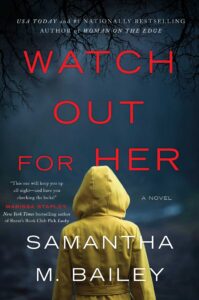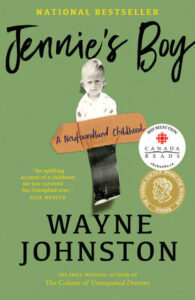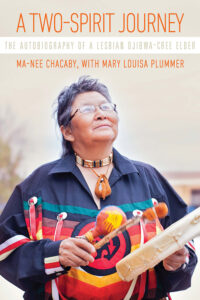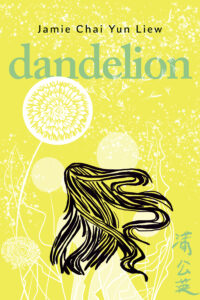Hello and welcome to my blog! Today I’ll be sharing my thoughts about the 5 books that will battle it out for the Canada Reads 2025 title next week (March 17-20).
If you’re not familiar with Canada Reads, it’s an annual competition on CBC (Canada’s public broadcaster) where 5 Canadian celebrities each pick a Canadian book and then square off against each other to defend their chosen book’s right to be called The Book That Every Canadian Should Read. One book gets voted off at the end of each episode, and the last one standing takes the title. Gotta love a friendly literary battle!
Read more about this year’s Canada Reads lineup here on CBC’s website.
Each year has a theme, and this year’s theme is “one book to change the narrative.” So let’s take a look at the 5 contenders and how I think they will (or should) fare in the competition.
Watch Out for Her by Samantha M. Bailey (championed by Olympic swimmer Maggie MacNeil)
I expect this one to be the first to go. To be honest, I’m not sure how or why it made it into the final 5. It’s the first representation of the thriller genre on Canada Reads, but that’s not what my problem with it is. Maggie MacNeil’s main defense is that reading can just be for fun, and that’s absolutely true, but the selections should still fit in with the theme no matter what genre they are. I don’t see how this book will change the narrative, unless the interpretation of “the narrative” is that Canada Reads should just be for literary masterpieces.
The thing is, this isn’t a particularly good thriller. I love thrillers and have read a good number of them, and this is one of the weakest and most predictable ones I’ve read. It also isn’t very Canadian. Maybe it was just the edition I read, but despite the setting switching between Toronto and Vancouver, the spellings and terminology were American. It was like the Canadian setting was an afterthought, and what with the current political climate and all, I found that really annoying. I don’t see how this book could be successfully argued into round 2. (But I love you, Maggie MacNeil!)
Jennie’s boy: A Newfoundland Childhood by Wayne Johnston (championed by author Linwood Barclay)
I used to consider myself a huge Wayne Johnston fan, so I was expecting to love this memoir of his childhood. However, that didn’t turn out to be what this book was. It’s more of an in-depth re-enactment of a few months of his childhood in which his chronic illness almost killed him. I was chronically ill as a child and almost died several times, too, so I related to young Wayne’s situation and remembered my own parents and family members having similar conversations to the ones he relates. Sadly, that didn’t make me enjoy this book… in fact, it made it very uncomfortable for me to read at times, and at other times it annoyed me with the repetition of the same scenarios and conversations seemingly happening on a loop. I know from experience that that’s how it feels to be a chronically ill kid, but I feel like there are better ways to write about it.
I suppose the change in the narrative that can be argued here is that it forces the reader to rethink the stereotypes we may have regarding poverty and illness and, well, Newfoundlanders, yet I think an argument could also be made that this book actually reinforces a lot of those stereotypes. I’m interested to see how Linwood Barclay defends this one, but I don’t expect it to be the winner.
A Two-Spirit Journey: The Autobiography of a Lesbian Ojibwa-Cree Elder by Ma-Nee Chacaby, with Mary Louisa Plummer (championed by podcaster Shayla Stonechild)
I struggled with this one. Ma-Nee Chacaby has had a turbulent life, and it’s hard to read about at times. I honestly don’t know how she got through the incessant violence she experienced in her younger years. The first half of this book describes one horrific trauma after another after another after another, to the point where I started to experience empathy fatigue and just felt angry. I would imagine that a lot of people wouldn’t be able to get through reading it at all, which is why I don’t think it will (or should) win. However, it certainly does fit the theme of changing the narrative, since there aren’t many autobiographies out there of two-spirit Indigenous Canadians that detail both their hardships and their joys. Also, the second half does get hopeful and inspiring. So I can see this being a contender. It just wouldn’t be my top pick.
Etta and Otto and Russell and James by Emma Hooper (championed by actress Michelle Morgan)
I can see this one winning it all. Set partly during the Great Depression and WWII and partly in the early 2000s, this novel follows Etta, her husband Otto, their neighbour Russell, and [don’t want to spoil it] James as 83-year-old Etta sets out from Saskatchewan on a cross-Canada walk while looking back on key moments in her life. It has everything you could possibly want from a Canada Reads contender – it fits the theme by challenging our ideas of what it means to grow old and forget, it talks of universal experiences like love and loss and difficult choices, it defies genres and really has something in it for everyone, and most of all it’s undeniably Canadian as Etta takes us on a journey across our great nation.
On the other hand, I could see the writing style being a challenge for a lot of readers (no quotation marks, very little indication of what time period each scene is in, confusion in the narrative as Etta herself experiences confusion), and I personally only rated it 3 stars for not quite being my cup of tea. So I wouldn’t be surprised if this one wins, but I also wouldn’t be surprised if it doesn’t.
Dandelion by Jamie Chai Yun Liew (championed by pastry chef Saïd M’Dahoma)
This is the one that I hope will be the winner. This is the story of Lily, the daughter of Chinese and Brunei immigrants in Canada. In many ways, Lily and her family represent every immigrant in Canada, as each one of them deals with issues of identity and belonging in different ways, and many struggle to obtain citizenship. This story also represents the many ways in which Canadians act towards immigrants, some kindly and some not, some meaning well but unknowingly doing as much damage as the openly unkind. This close personal glimpse into the lives of Asian immigrants could certainly help to change the narrative of anti-Asian hate that has been growing in this country since the pandemic.
I love the metaphor of the dandelion here, as Lily’s father explains it – “To some, this is a weed. But it’s really a flower. Like a dandelion, the Hakka can land anywhere, take root in the poorest soil, flourish, and flower. Look at this one. It’s growing in the crack of the asphalt” (p. 33). What a beautiful way to illustrate the perceived nuisance and the underlying strength and resilience of immigrants. Dandelions may pop up where you don’t want them to be, but if you nurtured them a little instead of immediately writing them off, you’d find they’re actually very beneficial in the garden and full of goodness and healing properties. Deep meaning, accessible writing, and a story that keeps you turning the pages. I definitely want everyone in Canada to read this book.
Well, those are my thoughts and predictions about this year’s Canada Reads contenders. What about you? Which one of these books do you think will win? Feel free to let me know in the comments below. And don’t miss the announcement of the winner on March 20!
(Note: If you are in the US and would like to purchase any of these books, this link will take you to the Canada Reads 2025 list on my Bookshop.org shop. Any purchase made through this affiliate link will earn a small commission both for me and for the local bookshop of your choice. Thanks for your support!)




